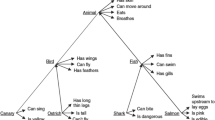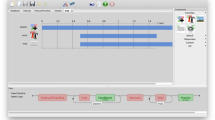Abstract
Recent work in psycholinguistics has revealed that the role of lexical stress in auditory word recognition may be a complex one involving other potential sources of information. In the present investigation, the nature of lexical stress effects on auditory word recognition in context is examined. The ability of subjects to identify words based on the prosodic pattern of the word is examined for the words in isolation and in a sentence context. The results revealed a small influence of stress on the identification of the stimulus waveforms relative to a large effect of context. The data indicate that lexical stress is used in the identification of the words; however, its role is minor compared to the importance of contextual information.
Similar content being viewed by others
References
Bernacki, B. (1981).WAVMOD: A program to modify digital waveforms (Research on Speech Perception, No. 7). Bloomington: Indiana University.
Carpenter, P. A., & Just, M. A. (1975). Sentence comprehension: A psycholinguistic processing model for verification.Psychological Review, 82, 45–73.
Clark, H. H., & Chase, W. G. (1972). On the process of comparing sentences against pictures.Cognitive Psychology, 3, 472–517.
Connine, C. M., Clifton, C., Jr, & Cutler, A. (1987). Effects of lexical stress on phonetic categorization.Phonetica, 44, 133–146.
Cutler, A. (1986). Forbear is a homophone: Lexical prosody does not constrain lexical access.Language and Speech, 29, 201–220.
Cutler, A., & Butterfield, S. (1988).Word boundary placement in faintly perceived speech. Paper presented at the 116th meeting of the Acoustical Society of America, Honolulu.
Cutler, A., & Clifton, C. E., Jr. (1985). The use of prosodic information in word recognition. In H. Bouma & D. G. Bouwhuis (Eds.),Attention and Performance X. Hillsdale, NJ: Lawrence Erlbaum Associates.
Cutler, A., & Norris, D. (1988). The role of strong syllables in segmentation for lexical access.Journal of Experimental Psychology: Human Perception and Performance, 14, 113–121.
Engdahl, E. (1978).Stress and rhythm in speech production and perception. Unpublished manuscript, University of Massachusetts, Amherst.
Evans, St. B. T. (1972). Reasoning with negatives.British Journal of Psychology, 63, 213–219.
Heuven, V. J. van (1985). Perception of stress pattern and recognition: Recognition of Dutch words with incorrect stress position.Journal of the Acoustical Society of America, 78, S21.
Nusbaum, H. C., & Pisoni, D. B. (1986).The role of structural constraints in auditory word recognition. Paper presented at the Montreal Symposium on Speech Recognition, Montreal, Canada.
O'Malley, M., & Peterson, G. (1966). An experimental method for prosodic analysis.Phonetica, 15, 1–13.
Pisoni, D. B., Nusbaum, H. C., Luce, P. A., & Slowiaczek, L. M. (1985). Speech perception, word recognition and the structure of the lexicon.Speech Communication, 4, 75–95.
Slowiaczek, L. M. (1987).On the role of lexical stress in auditory word recognition. Unpublished doctoral dissertation, Indiana University, Bloomington.
Slowiaczek, L. M. (1990). Effects of lexical stress in auditory word recognition.Language and Speech, 33, 47–68.
Taft, L. A. (1984).Prosodic constraints and lexical parsing strategies. Unpublished doctoral dissertation, University of Massachusetts, Amherst.
Wason, P. C., & Johnson-Laird, P. N. (1972).Psychology of reasoning: Structure and content. Cambridge, MA: Harvard University Press.
Author information
Authors and Affiliations
Additional information
This article is based on sections of a doctoral dissertation presented to Indiana University, Bloomington, Indiana. This research was supported in part by NIH research grant NS-12179-08 to Indiana University and a Graduate Student Grant-in-Aid of Research from Indiana University.
Rights and permissions
About this article
Cite this article
Slowiaczek, L.M. Stress and context in auditory word recognition. J Psycholinguist Res 20, 465–481 (1991). https://doi.org/10.1007/BF01067638
Accepted:
Issue Date:
DOI: https://doi.org/10.1007/BF01067638




